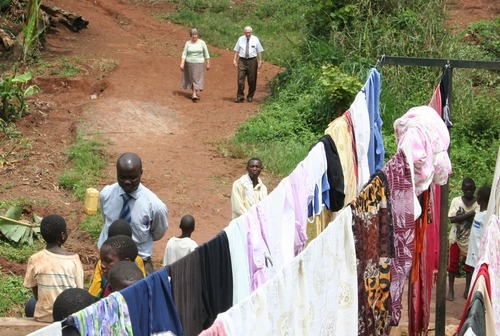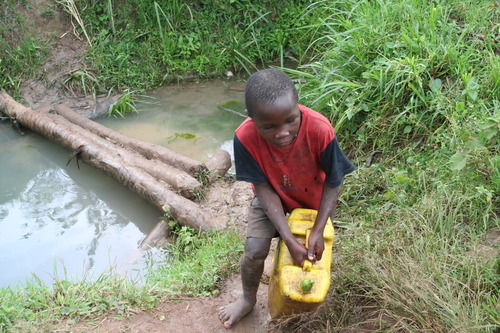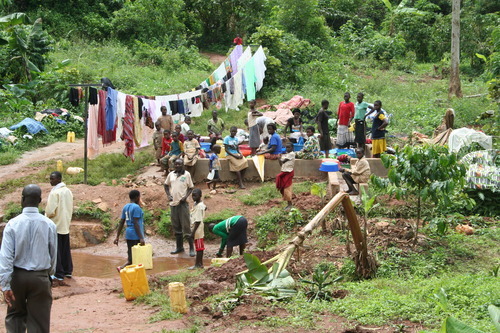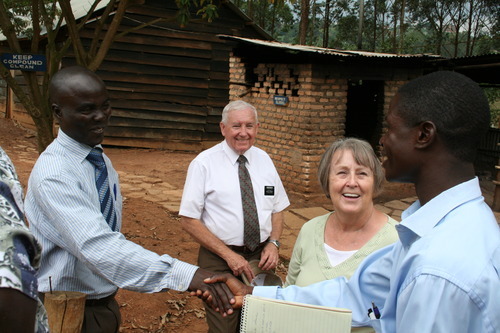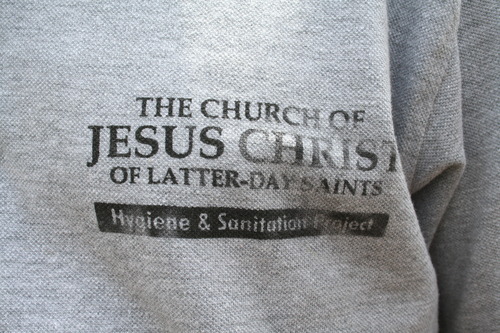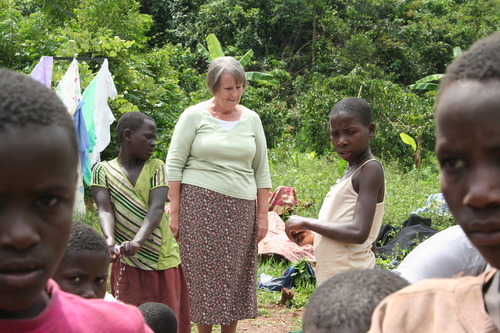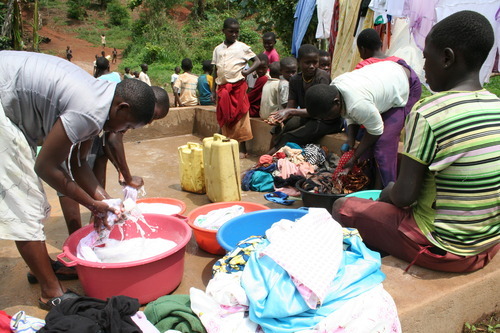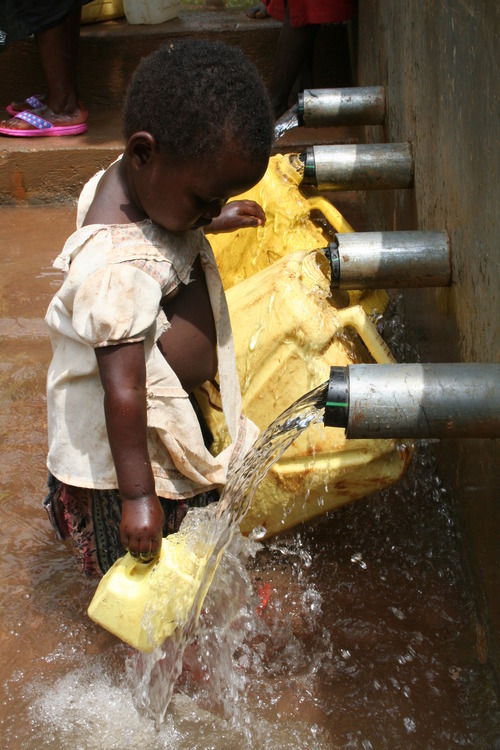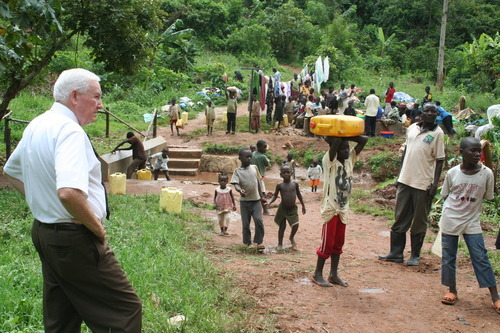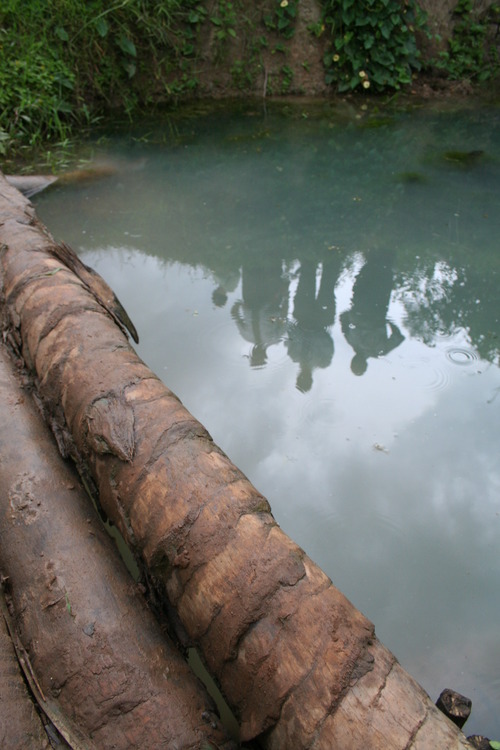This is an archived article that was published on sltrib.com in 2011, and information in the article may be outdated. It is provided only for personal research purposes and may not be reprinted.
Masaka, Uganda • The water was perfectly clear. But it wasn't always that way.
Months ago, children dipped their jugs into something startlingly different in a tropical ravine near this southern Uganda town. Something murky. Something polluted.
Times have changed — all because of a senior missionary couple from Taylorsville.
Hiking down a steep trail through African palms, Lincoln and Marilyn Barlow can make out three clotheslines hanging heavily in the gully. Shirts and dresses of all colors and varieties drip-dry while women prepare the next batch of laundry in buckets nearby.
Marilyn pauses to snap a photo. She's smiling.
For the past five months, the Barlows have been working with The Church of Jesus Christ of Latter-day Saints to provide cleaner water and better sanitation for southern Uganda.
Their work hasn't been the "touchy-feely" sort, Marilyn muses. Rather, it has been practical and potentially life-changing for an African nation where people still draw water for washing, bathing and drinking from ponds so filthy that children sometimes have to clear the surface before filling their jugs.
Within the tropical forests of southern Uganda, where mud-brick villages rise from the red dirt, the Barlows have completed an expansive clean-water project funded by the Utah-based LDS Church. They have created 60 clear-water springs. They have built 16 school latrines. They have established 10 hand-washing stations. And they have installed 15 rainwater-collection tanks capable of storing up 10,000 liters of water.
That's not counting the hygiene and sanitation classes they conduct for schools and community groups or the 25 latrines for needy families they put into a village known as Katoogo.
The fruits of those labors are no more evident than in that lush gully outside of Masaka, where clotheslines sag under the weight of a community's garb. The three lines — modern for villages that previously draped their laundry over bushes — are filled.
Nearby, fresh water pours from a piped spring.
"This is my touchy-feely," Marilyn says after descending a rugged trail to find the washing area occupied by dozens of women and children at work.
The community washing area — a concrete basin with laundry lines and clean water nearby — had been her idea. From the soapy tubs of clothes speckling the concrete and the continual flow of children replenishing water buckets for their mothers, it had been a popular one.
Although the Barlows carry Mormon missionary badges, they aren't looking for conversions. Instead, the couple have a decidedly humanitarian purpose — one that brought tears to Lincoln's eyes on a drizzly afternoon as he paused beside an algae-rimmed pond where children squatted on a pair of rain-slick logs and dipped their five-gallon jugs for drinking water. The children then plugged their jugs with green bananas and hauled them up the hill.
"You saw me hungry and you gave me meat. You saw me thirsty and you gave me water," Lincoln Barlow said, his voice breaking with emotion as he cited the New Testament passage. "That's what we do."
The imprint of the Barlows' work — estimated at $250,000, paid by the LDS Church — is seen across southern Uganda:
• Their hands have touched the St. Bruno Ssaza Primary School in Masaka, where children no longer spend part of their school day trekking water from a spring two kilometers away. The school now has a rainwater-collection system.
"We have changed pupils' lives in this school," says former student Eddie Mutebi, who is carrying out the church's water projects as executive director of the Union of Community Development Volunteers.
• Their hands have touched a polluted spring in a nearby rural gulch, where villagers now fill their five-gallon jugs from a spigot so clean that people have started selling the water in town for double the normal price — about 9 cents a bucket.
"Now that it is here, the villages around here don't want to go anywhere else," says Ssimbwa Kakinda, a Mormon and chief of the local Kobe clan who has been monitoring the project. "As these get built, the demand doubles and triples. You see lines — long, long lines."
• Their hands have touched the St. John Paul Mugwanya School, where a new latrine with six stalls stands in a grove with a wash basin nearby. It replaces a crumbling brick latrine that had nearly reached capacity.
"Our children could have easily been contaminated by nearby water and food," School Director Paul Mugwanya says. "With this new latrine, we are able to keep our children free of any disease or harm that might come to them. … We are still bad off, but we are so thankful."
Those projects are just pieces of the LDS Church's hulking humanitarian effort in Uganda, where three to four water initiatives — each costing hundreds of thousands of dollars — are done every year.
And yet, Lincoln Barlow can't help but wonder if his work is making a dent in an African nation so smitten by poverty that most people do without running water, sewer and electricity. Many live in mud shanties or thatched-roof huts.
But the problems go deeper than that. Thousands continue to die every year from malaria, typhoid fever, AIDS, dysentery, tuberculosis and whooping cough. And countless others are recovering from the emotional trauma of civil war and ethnic strife that have resulted in murders, rapes and the forced enlistment of children as soldiers and sex slaves in rebel armies.
Bouncing through southern Uganda's backcountry in an SUV toward one of the church's springs, Lincoln Barlow relates a story of a man who walks along a beach throwing starfish, one by one, back into the water. He cannot possibly save them all. But he can save a few.
That's how Barlow sees his work.
"We are doing the best we can," he says.
It's a mission of the heart that the Barlows hope will spread clean water and living water to a nation thirsty for both.
jstettler@sltrib.com Watch our videos from Uganda at http://bit.ly/g8DmyV


